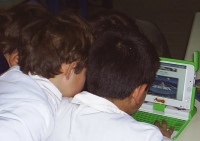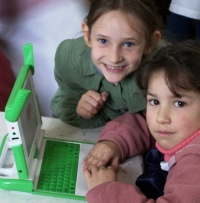One Laptop Per Child had its Uruguayan pilot project in Villa Cardal, a rural dairy farming town of 1,500. There, the local elementary school has about 150 students, and in May of 2007, every child received XO-B2 laptops.
In August of 2007, about three months into the pilot experience, Juan Pablo Hourcade, University of Iowa, Daiana Beitler, London School of Economics, Fernando Cormenzana, NEXT Consulting, and Pablo Flores, Universidad de la República, visited the school and reported on their impressions of Early OLPC Experiences in a Rural Uruguayan School.
While you can read the full report through the link above, here are several themes that caught my interest:
The Importance of New Games
The children were very excited about playing games; those that came with the computer, but even more so, games that they found on the web. After we completed the activity, we observed the children during free time and most of the boys seemed intent in finding and playing games online with small crowds gathering around computers when someone found a new game.
Local Content Trumps Cool Applications
One interesting comment that clarified the negative view of the music authoring program [TamTam] was that children wanted to make music that sounded like the popular music they listened to on the radio (e.g. one child mentioned wanting to make music with cumbia rhythms). This emphasizes the need to localize the technology.
Hardware and Software User Interfaces Matter
In spite of the fact that the user interface to Squeak was in English, the children were not afraid to try it out and did not have much difficulty understanding how to get to specific functionality. What caused the most problems again were issues with pointing and clicking on icons. These problems were caused both by touchpads that were not particularly accurate, and by the graphical interface elements in Squeak being very small. These problems meant that the greatest difficulty was not in terms of understanding concepts, but in being able to click on icons and control the cursor when drawing.
Teachers Embrace Laptops, When They Help Learning
Of particular interest were the comments of a very experienced teacher who at first thought the laptops would not make a positive difference in the classroom. She has changed her mind as she has seen the laptops motivating children to read and write more than they did before the laptops arrived. She thought this was due mostly to children having access to a much wider set of materials from which to read (the school has a very small collection of physical books available), and the opportunity to easily share what they write with classmates and with the entire world through the school's blog.
1:1 Laptops Increase Social Interactions
The fact that every child had a laptop seemed to encourage rather than discourage social interactions. This was in contrast to previous criticism of the use of computers in schools that has centered on the idea that computers isolate children (e.g. [1]). We observed exactly the opposite. When one of the children got to do something before other children, a small crowd would form around the child's computer.
Children were particularly interested in seeing how other children got to complete tasks they were having difficulty completing themselves, as well as seeing content of interest that another child found (e.g. a new web-based game). The size, weight, wireless and tumble-proof nature of the laptops also made it possible for children to move around the classroom holding laptops, enabling them to show other children something they did, or to seek help next to another child or their teacher. These social behaviors made it so that knowledge about how to do something or how to access content would quickly spread throughout the classroom.
Fund More Than Just Hardware
An additional challenge, which may be replicated in other countries, is that while the Uruguayan government is making a great effort in providing funding for the hardware, there is no funding for designing and developing software and content for use with the laptops, or for conducting a thorough evaluation of the educational and societal outcomes of the project. This compromises the effort by limiting the potential of the technology and what we can learn from its use.
Overall, OLPC Did Inspire Learning
The impression we brought back from our visit to Villa Cardal was that the laptops appeared to have a very positive impact and transformed the way the children learn in spite of serious hardware and infrastructure problems. The spotty connectivity to the Internet and unreliable input devices did not get in the way of children accessing information resources that were previously unavailable, creating content for the world to see, and increasing their interest in reading and writing.
Special thanks to Felix Newall-Smith for the tip




"carrying coal to Newcastle"
That reminds me of when someone on Slashdot jokingly asked if WINE supports Cygwin.
cf. "..though ... great effort in providing funding for the hardware, there is no funding for designing and developing software and content for use with the laptops, or for conducting a thorough evaluation of the educational and societal outcomes of the project. .."
Can we equally ask other GO's and NGO's to take up their responsibility and organize themselves to the extent they can unlock a budget and go the next mile if they want to support OLPC iso putting all the load on OLPC ?
Let them take an example of : Juan Pablo Hourcade, University of Iowa, Daiana Beitler, London School of Economics, Fernando Cormenzana, NEXT Consulting, and Pablo Flores, Universidad de la República, who organized themselves and things so they could find a budget and go and visit the OLPC deployment to evaluate and report back.
If individuals, ngo's, go's cannot get themselves to organize themselves... aren't they "saloon-bourgeois-"individuals, "saloon-bourgeois-"ngo's, "saloon-bourgeois-"go's ?
The OLPC Education Project has suggested with all the basic pre-research that it is an interesting project. It has found funding, it even made the smallest school so that it can fit in a box. It found budgets and is inspiring so many that others team-up.
What do they have to do more ? One guy has to now solve all Millennium Development Goals and Agenda 21 and the Global Climate Destabilization too so others can stay in their sofa?! Get up your lazy asses, you've been given even a wiki where you can develop your stuff, use skype to communicate/develop it with a team-member, etc.
There's a whole world out there...
So, it works. That's nice.